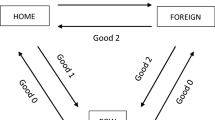Abstract
We examine the efficiency of federal policies in a federation characterized by decentralized leadership, imperfect labor mobility and transboundary pollution. Selfish regional governments regulate correlated pollutant emissions by choosing pollution tax and abatement levels in anticipation of the center’s redistributive policy. The center’s objective function obeys a proportional equity principle, which implies that its choice of interregional transfer satisfies the equalization of weighted regional welfare levels. Regional and central governments make their choices subject to migration incentives. We show that the subgame perfect equilibrium for the sequential game played by regional and central governments yields socially optimal policies.
Similar content being viewed by others
References
Caplan AJ, Cornes RC, Silva ECD (2000) Pure public goods and income redistribution in a federation with decentralized leadership and imperfect labor mobility. J Public Econ 77: 265–284
Caplan AJ, Silva ECD (1999) Federal acid rain games. J Urban Econ 46: 25–52
Caplan AJ, Silva ECD (2005) An efficient mechanism to control correlated externalities: Redistributive transfers and the coexistence of regional and global pollution permit markets. J Environ Econ Manage 49: 68–82
Caplan AJ, Silva ECD (2007) An equitable, efficient and implementable international scheme to control carbon dioxide emissions. Int Tax Public Finance 14: 263–279
Hoel M, Shapiro P (2003) Population mobility and tranboundary environmental problems. J Public Econ 87: 1013–1024
Hoel M, Shapiro P (2004) Transboundary environmental problems with mobile but heterogeneous populations. Environ Resour Econ 27: 265–271
Mansoorian A, Myers GM (1993) Attachment to home and efficient purchases of population in a fiscal externality economy. J Public Econ 52: 117–132
Nagase Y, Silva ECD (2000) Optimal control of acid rain in a federation with decentralized leadership and information. J Environ Econ Manage 40: 164–180
Santore R, Robison HD, Klein Y (2001) Strategic state-level environmental policy with asymmetric pollution spillovers. J Public Econ 80: 199–224
Silva ECD (1997) Decentralized and efficient control of transboundary pollution in federal systems. J Environ Econ Manage 32: 95–108
Silva ECD, Caplan AJ (1997) Transboundary pollution control in federal systems. J Environ Econ Manage 34: 173–186
Wellisch D (1994) Interregional spillovers in the presence of perfect and imperfect household mobility. J Public Econ 55: 167–184
Author information
Authors and Affiliations
Corresponding author
Additional information
An erratum to this article can be found at http://dx.doi.org/10.1007/s10640-008-9199-7
Rights and permissions
About this article
Cite this article
Naoto, A., Silva, E.C.D. Correlated Pollutants, Interregional Redistribution and Labor Attachment in a Federation. Environ Resource Econ 41, 111–131 (2008). https://doi.org/10.1007/s10640-007-9183-7
Received:
Accepted:
Published:
Issue Date:
DOI: https://doi.org/10.1007/s10640-007-9183-7
Keywords
- Correlated pollutants
- Decentralized leadership
- Labor attachment
- Income redistribution
- Proportional equity




